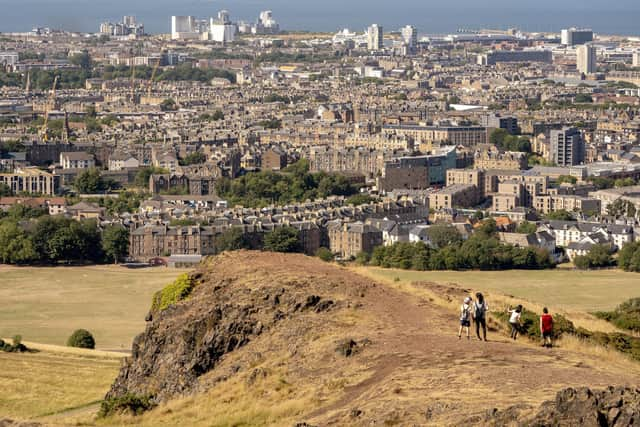The heat could not be higher on our need to act on climate change - Professor Gabriele Hegerl
Last summer was a record breaker in many regions of the UK – it was hot and very dry, mostly so in England, where for the first time a level 4 weather warning was issued by the Met Office amid warnings of ‘danger of illness and death in the fit and healthy’. A wildfire burned down several houses in London.
Meanwhile, an amber warning was issued in Scotland. Muggy night temperatures made it hard to sleep and on one of the hottest days, Network Rail stopped most of its trains on the East Coast Mainline. Not everything is nice about a heat wave.
Advertisement
Hide AdAdvertisement
Hide AdRecent years have seen record breaking heat events worldwide, with rising numbers of death by heat worldwide, particularly among the vulnerable. Pakistan and India saw a spring heat wave this year that sharply reduced harvests. In 2021, a heatwave in the Northwestern USA and Western Canada exceeded previous records by a wide margin. Cooling shelters were in place to protect the population. The town of Lytton burned down shortly after setting the record for the hottest recorded temperature in Canada.


Drought, heat and fires have also plagued California in recent years, with record fires causing very poor air quality. In Europe, the 2003 heat wave caused tens of thousands of extra deaths and had a severe impact on crops, many of which are sensitive to very high temperatures.
Fires have been plaguing the Mediterranean ever since, with the prime minister of Greece in 2021 calling these ‘ecological disasters’. Australia’s ‘angry summer’ of 2012/13 also saw record heat and fires, and the country has been plagued by more dramatic fire seasons since. Extreme temperatures have also affected its seas: recent heat waves in the ocean are a severe threat to coral reefs, with a large fraction of the Great Barrier Reef corals bleached in 2022. Large bleaching events were also recorded in 2016, 2017 and 2020. Coral reef bleaching and subsequent coral death is directly linked to warmer seas and will become more frequent, even under modest levels of further warming.
Coral reefs, and the nurseries they provide for fish and the ocean ecosystem, face a bleak future if global temperatures are not stabilised soon.
Heat waves have always occurred and UK records show severe heat in the summers of 1911 and 1923 caused health problems in farm workers, stressed horses and impacted sports. However, in a warming world these heat events are like athletes on steroids – they are much stronger and sometimes beat records by a large margin. This extra heat will dry out the land more, increasing the risk for drought. The heat will also dry out the vegetation, increasing fire danger and the potential to disrupt food supplies. Wildfires also release a lot of carbon back to the atmosphere, with the Californian fires in recent years adding CO2 to the atmosphere at a level comparable to its fossil fuel emissions.
Drought-stressed vegetation also takes up less CO2 from the atmosphere, so the impacts of climate change through heat, drought and fire work against our efforts to reduce carbon emissions.
The warming that we are presently observing is in line with what has been predicted and highlighted by the Intergovernmental Panel on Climate Change (IPCC) for decades. Their recent report shows that now, at over 1 degree of global warming, we already see a worrying rise in extreme heat events.
This rise is expected to continue with any further warming. If we exceed the Paris targets of staying below 1.5 or 2 degrees warming, some global regions will frequently reach heat that is dangerous to humans, and sometimes deadly under prolonged exposure.
Advertisement
Hide AdAdvertisement
Hide AdWhat worries me most are the severe consequences we have already seen from extreme heat, drought and fire, and this will only get worse with every degree of further warming. Even if we manage to keep warming at Paris targets, we will see severe heat waves and their consequences.
At further warming, all bets are off as to what the consequences are. Ecosystems and humans have adapted throughout their history to change, yet the change we are imposing on them now is so fast.
When will the effects of climate change outpace the ability to adapt, where will people go that are displaced by drought and heat? And what will happen to iconic wildlife and ecosystems if their normal home region is too hot, dry or fire prone to stay? I admit I am very worried for the future if we do not get our act together on climate change - not only because of the amazing natural world
we are endangering but also the livelihoods of our children and grandchildren in a world that is rendered increasingly unstable by extreme weather events and their consequences.
Continuing our fossil fuel extraction is a dangerous gamble with very limited benefits. We can do better - we can live in a world where most of our energy is generated by renewables and where our air quality is better as, over time, the combustion engine largely disappears from cities.
The energy transition can bolster innovation and new opportunities. We can be healthier if we eat more sustainably with more plants in our diet, and move more when using public transport, walking or cycling. And we can continue to enjoy our amazing natural world. That world is under threat from multiple stressors –our overuse of land and sea resources, climate change, and other consequences of humanity’s
footprint and consumption patterns on the planet. We can and must do better than that, and we can keep the future bright.
Gabriele Hegerl is professor for climate system science at the University of Edinburgh